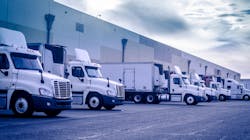How open technology platforms will drive the future of fleets
Logistics is the practice of determining methods to move goods from one point to another. Examples of historical supply chain improvements include the development of roads 6,000 years ago, to the steam engine 200 years ago, and, most recently, shipping containers 70 years ago.
Logistics optimization has been about taking friction out of the system network through the simplification and standardization of products and processes, suggested Uber Freight CEO Lior Ron.
“If we look at trucking and logistics today, I fundamentally believe we're at a crossroads,” said Ron. “We all know the pressure on the system. We know the many hours drivers are wasting every day, we know the huge waste and inefficiency in planning the route and planning the logistics network. We know the inefficiencies with facilities, and we know the data is still siloed — not connected, not fully standardized.”
The digital transformation and open platforms afforded by technology-forward freight companies will drive the next generation of logistics operations. Optimized freight movement will be made possible through better utilization of shipping methods through connectivity and standardization between all stakeholders in the supply chain.
Connectivity and transparency
When it comes to connecting and standardizing fleet operations, telematics plays a key role.
Before expansive development of different applications to integrate with telematics can take place, it is critical that a design provide technology developers a base to build from. Platforms have already been developed, said Jack Kennedy, CEO at Platform Science. The next step for the transportation industry requires a new level of openness and active collaboration between carriers, brokers, fleets, and technology providers.
When it comes to a telematics solution, Kennedy suggested the landscape has become “unbundled,” meaning many organizations involved with telematics product development operate as separate entities. This can be beneficial because it allows for flexibility and customization of technology solutions. But, this approach can also create additional challenges.
“Looking at the trucking space, I realized that there was no way to innovate from an unbundled perspective,” Kennedy said. “Now telematics is unbundled, allowing developers the ability to develop (products) relatively easily; fleets the ability to choose whatever they want to run and orchestrate their own telematics solution suite. We provide the tools to manage all that.”
Platform Science works to provide a comprehensive logistics solution by offering various options for fleets. “We do provide a full suite of telematics solutions for traditional large carriers. But more importantly, we're a platform for developers and fleets that want to manage their own choice,” noted Kennedy.
When it comes to open platforms, availability of data for other stakeholders in the supply chain to access sits on a spectrum. Kennedy suggested fleets must first be sure they are mindful of data security and standardizing information. “You only need to take ‘open’ as far as you need to so people can use it, but not so far that they can abuse it or damage the system,” he suggested.
Additionally, clean data is imperative before moving forward with accelerated technology adoption. Asset-based logistics company Gulf Relay dedicated a two-year investment to clean up its data before actively pursuing open platform technology options.
“We've spent over two years investing in cleaning up our data, getting it into the cloud, and aligning ourselves with best-in-class platforms that can move data in and out of their systems natively,” Gulf Relay CEO Scott Auslund advised. “That's a huge investment that the business has to commit to and really see it through. That's the biggest single barrier I see in the traditional asset space, to be able to take advantage and leverage some of this new tech.”
Steps that accelerate adoption
Brokerage firms and third-party logistics providers (3PLs) have been at the forefront of technology adoption to improve their operations within the supply chain, compared to traditional fleets.
“At the end of the day asset-based companies typically struggle from a valuation standpoint, and they don't have tremendous amounts of cash laying around because it's tied up in physical assets. The ability to invest, in a micro way, the things that actually drive innovation really, really quickly by building on the top of a platform, to me that's transformational, and I think you're going see that accelerate even in the asset space,” said Auslund.
As a fleet, benefits of connecting to an open platform supply chain network include higher asset utilization, optimized route planning, better driver communication, and more seamless interactions with shippers and warehouses. This approach provides fleets a stake in how they conduct business and interact with the entire supply chain. This can accelerate innovation, Ron said.
Accelerated adoption of technology has also been evident through operational changes since the beginning of the COVID-19 pandemic, in March.
The pandemic has required fleets to adjust operations in order to still conduct business while operating safely. This has forced fleets to update processes and consider adopting new technology to address these needs.
“Asset-based trucking traditionally has been a very in-person job,” Auslund said. “You have planners around the table, you're talking to each other, ‘Hey, I got these drivers coming in, do you know that he's ready to pick up on the yard?’ or ‘She's ready to drop this.’ A lot of that is still a human interaction. What COVID has forced many fleets to do is say, we have to learn how to do that virtually.”
Technology that enables touchless interactions like speech-to-text, digital document sharing, and integration of different technologies with the transportation management system (TMS) to allow for streamlined decision making have all evolved, and adoption has accelerated since the beginning of the pandemic. “I think collaboration at distance is going to be something that's going to differentiate the winners from the losers as we go forward,” noted Auslund.
And the acceleration of technology adoption will continue moving forward. “Whether it's a pandemic, or new regulations, or shifts in the business, fleets realize they have to solve problems much faster; they can't wait for a solution to come anymore,” Kennedy said.
Getting to growth mode
When it comes to actionable areas fleets can focus on to facilitate business growth, fleets would do well to hire a technology-focused executive, such as a chief information officer (CIO) or chief technology officer (CTO), to help drive technology decision making and adoption.
Ausland noted Gulf Relay hired a CTO with 30 years of experience to prioritize the needs of technology decisions for his fleet.
“For us, we think about it in three ways: Does it impact service? Does it impact safety? Or, does it impact the bottom line? If you can do those three things really, really well your drivers will stay with you, they'll be excited to be here; your customers will stay with you; and you'll operate safely for the general public and all of your stakeholders,” Auslund said. “If it doesn’t fall into those three buckets and make a meaningful impact, you’re going to have a hard time selling us on it.”
Another area of focus includes assessing the return on investment (ROI) for any technology adoption considerations, suggested Auslund.
“We try really, really hard to break everything down into numbers, not because numbers are all that matter. But typically the discipline of going through an ROI exercise, whether you ultimately decide that's the only thing you care about, or not, going through the exercise in that discipline on a consistent basis is good for an organization,” he said.
“Safety has a cost. Recruiting has a cost. Driver retention has a cost. If we can break that down and say, if I were to invest $100 in this piece of technology, versus $100 in sales, versus $100 in driver recruiting, what will that return be for me within six months or a year, whatever the time horizon is,” Auslund added.
When it comes to focusing on business growth as a fleet, Cameron Ramsdell, president of Variant, suggested fleets focus on three key areas: utilization, attrition, and the operating leverage. A subsidiary of U.S. Xpress, Variant was established in June 2019 with just five trucks. Variant now operates with more than 550 trucks.
“This business has been razor thin margins for a long time, and you measure everything by the penny — how many pennies per mile does that cost? You have to stay cognizant of those costs and understand what levers you can pull to drive operating leverage through it,” said Ramsdell.
Another area to consider to help with growth and scaling a fleet is to prioritize the driver. Variant has developed driver applications based on feedback. Ramsdell emphasized the importance of treating drivers like another customer, not just an employee.
“The number-one thing is that you can invest in drivers is be easy to do business with,” Ramsdell said. “Don’t make it really difficult to get on get you on the phone. They need to make it easy for them to connect with you in an omni channel environment, irrespective of device or however they want. Just resolve or track your time to resolve their issue. It's really little things like that, that go very long way.”
About the Author
Erica Schueller
Editorial Director | Commercial Vehicle Group
Erica Schueller is a former editorial director of the Endeavor Commercial Vehicle Group.

